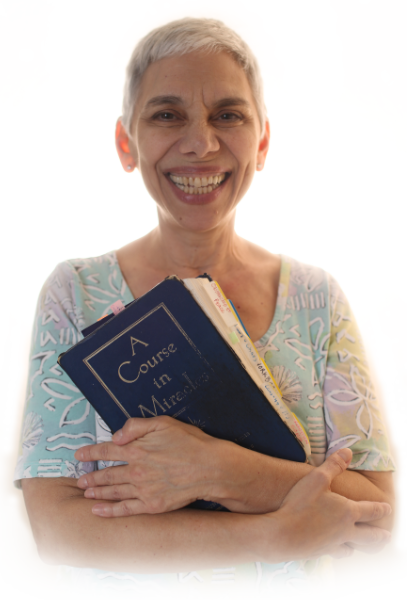01 Oct 2014 Comments Off on Ask Amy: Insight Into Prayer: ACIM and Ho’oponopono
Ask Amy: Insight Into Prayer: ACIM and Ho’oponopono
 Q: I pray that we would know the Peace of God, but I have mixed feelings … for those I see as suffering in some way, I take responsibility by saying, “I’m sorry; please forgive me; thank you; I love you.” Can you offer some insight about prayer practice?
Q: I pray that we would know the Peace of God, but I have mixed feelings … for those I see as suffering in some way, I take responsibility by saying, “I’m sorry; please forgive me; thank you; I love you.” Can you offer some insight about prayer practice?
 A: Let’s begin with what A Course in Miracles means by prayer. In Chapter 3, we’re told, “… the only meaningful prayer is for forgiveness … The prayer for forgiveness is nothing more than a request that you may be able to recognize what you already have.” (T-3.V.6:1-5) You can apply this to your brothers simply by requesting that they recognize what they already have — which is timeless, formless, unified Love.
A: Let’s begin with what A Course in Miracles means by prayer. In Chapter 3, we’re told, “… the only meaningful prayer is for forgiveness … The prayer for forgiveness is nothing more than a request that you may be able to recognize what you already have.” (T-3.V.6:1-5) You can apply this to your brothers simply by requesting that they recognize what they already have — which is timeless, formless, unified Love.
In The Song of Prayer, an essential supplement to ACIM, it says, “Prayer is a stepping aside; a letting go, a quiet time of listening and loving. It should not be confused with supplication of any kind, because it is a way of remembering your holiness.” (S-I.5:1-2) Holiness belies suffering.
It may seem harsh or unrealistic to point this out, but suffering is only seen by the ego. Since ACIM is teaching us to identify the voice of the ego in order to be free of it, it is necessary to clarify your thought process. You’re not being asked to pretend or lie — if you see human suffering and your heart yearns to help in some way, prayer is a great choice. However, the way you pray makes all the difference.
Jesus is uncompromising in explaining that seeing suffering is not compassionate, and what we consider worldly problems are not only absurd, but unreal. Still, we are using the world as a classroom to discover that we are delusional and hallucinating, and prayer uncovers the Answer.
Your mixed feelings indicate you are lacking faith that God can provide the Peace of God. Your desire to take responsibility is an indication of playing ego god. As a Course student, look very honestly at your motivation for saying, “I’m sorry; please forgive me; thank you; I love you.” which is the Hawaiian practice of ho’oponopono.
According to www.ancienthuna.com, “Ho’oponopono means to make right. Essentially, it means to make it right with the ancestors, or to make right with the people with whom you have relationships. We call this the Hawaiian Code of Forgiveness, and it’s an important thought, because when we forgive others, who are we forgiving? Ourselves, of course.” Ho’oponopono is a valid spiritual path.
The Course also teaches that it is only yourself that needs to be forgiven, and that the only mind that needs healing is your own. The telltale sign that your choice to use ho’oponopono is ego-driven is that you have mixed feelings. Inner conflict is always of the ego.
If you were practicing with your Inner Teacher, your prayer would be that everyone recognize what they already have and what they already are. As a Course student, your prayer method is to step back and let the Holy Spirit lead the way. Say, “Holy Spirit, help me recognize what I already am, and, in so doing, save the entire world.”
Then you come to realize the world is not real and you have been dreaming! Prayer is both a process of discovering your true Identity, and a state of Being in which you live as your true Identity. Forgiveness helps you undo all belief in individuality and discover you are prayer.
Through the prayer process, you come to realize that by imposing a personal sense of responsibility you actually reinforce the very suffering you wish to heal. Rather, you need do nothing except to allow the Holy Spirit to use you as a conduit for His loving, light-filled miracles.
If you would like to pray together, watch Five Keys to Forgiveness on YouTube.
This Q&A appears in the Ask Amy column from the Sept-Oct 2014 issue of Miracles magazine. Miracles is a well-loved staple in the ACIM community. To get a subscription, email Jon@miraclesmagazine.org or call 845-496-9089. To ask Amy a question, email miracles (at) amytorresacim (dot) com


Connect with Amy